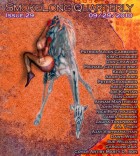I read “Guard” as distinctly allegorical. The guard declares, “I am what she can only strive to be. I am what is not. I am dark matter. Security.” He seems to represent a judgment that the palpable absence of—definition? manipulation?—makes art, art. Would you talk a little about whether this was your intent and whether there was a particular motivation for the story?
I saw a Novai>-like show about dark matter, how scientists know that it exists because some light waves firing to earth bend and curve all around a precisely shaped nothingness. I thought, boy howdy, this is how so much art, plastic or literary, from the 20th and 21st Century behaves: Its true content is what it refuses to describe explicitly, but the shape of its meaning may be precisely limned by implication. So we know we are in an art gallery and not a button factory because there is a figure present who is reliably not art. The guard is not, therefore the installation is. But my guard is ornery and, you’re absolutely right, Lauren, he won’t be defined or manipulated. He ingests art as commodity, literally, as his lunch. He out-maneuvers his artist.
You share a name with a popular televangelist, whose high visibility keeps you much lower in Google search results than one would expect. What do you think of this? What is your own definition of faith? What would you do if you were mistaken for him?
His biography is Dickensian and way better than mine (he was born in a charity ward, the product of rape, with an alcoholic father or some such) so when I’m mistaken for him, I just go with it. “Sure, I wrote The Way to Know Thy Saviouri>, and let me tell you, it was a bitch. Now go swim laps and rent some Panda DVDs.”
As for my definition of faith or my beliefs, I’m in agreement with Wallace Stevens who said that one’s faith, like one’s patriotism, one keeps to oneself as a kind of savor, not as public utterance/announcement. I avoid the bumper sticker thing.
You emerged as a powerful presence on Fictionaut, where your story, “Mars,” is one of the top recommended and “favored” stories by other writers on the invitation-only site. You are a also a frequent commenter. Why does this site appeal to you? Is this a useful writers’ community for you?
Thank you. I was asked to comment on the site by the founders, so I’ll paraphrase myself. Fictionaut is a test track and display room for works in process and as a writer, your readers there make up a community of trusted and truthful equals, eerily reliable so far. Writing into a void is miserable, like telling jokes to a wall. Fictionaut provides a round-the-clock, faithfully attentive audience. It’s a post post graduate-level workshop.
Your career has involved successes as a novelist and screenplay writer, as well as a master of the short story. Your work has appeared in The New Yorker and other very impressive venues. Lately, as with “Guard,” you have displayed remarkable skill at writing flash/very short fiction. Why does this form appeal to you?
Thank you again. In 1978-ish, R.V. Cassill, my writing professor-person in grad school, said my work was like previews or trailers, rather than feature films. I was complimented. I was having an e-mail chat with Gary Percesepe, (novelist, poet, Fictionaut founder, editor, friend of Derrida), and he extracted something I said to him for a piece he posted in BLIP (formerly Rick, formerly The Mississippi Review on-line). Sloppy, but it sums up my attitude. “For years, decades, I tried to teach the students to do lightning strike stuff. Bang. Blinding light. Whiff of burnt earth. Then go away and do not worry about anything because you have not done the great damage of boring anybody. It was years of this. NOW many are doing it and NOW, 25, 30 years later, it’s good that they are and I am happy to see such stuff and even that its name is FLASH fiction.”
On a related note, the debate about print versus web publishing shows no signs of waning. Despite your successes in print, your work has appeared recently in web publications, including Smokelong and Corium. I won’t ask you why print or on-line is better than the other. Rather, I’m interested in hearing how your own experience has informed your participation in publishing on the internet, and/or the reverse.
I will now be extra pompous. One should write because one has made a discovery of content and has learned a form to best convey that discovery. Nothing else matters. Okay. The end. But. When one is happy with a product, proud of it, there is a joy in sharing. That joy is exactly the same, according to me, whether the work is online or in print.



 The core workshop of SmokeLong Fitness is all in writing, so you can take part from anywhere at anytime. We are excited about creating a supportive, consistent and structured environment for flash writers to work on their craft in a community. We are thrilled and proud to say that our workshop participants have won, placed, or been listed in every major flash competition. Community works.
The core workshop of SmokeLong Fitness is all in writing, so you can take part from anywhere at anytime. We are excited about creating a supportive, consistent and structured environment for flash writers to work on their craft in a community. We are thrilled and proud to say that our workshop participants have won, placed, or been listed in every major flash competition. Community works.